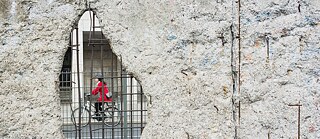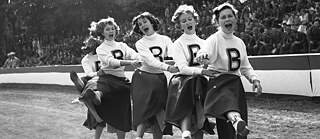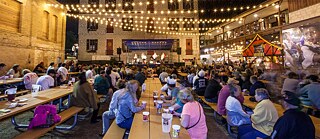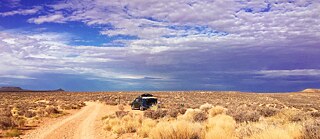German bicycling culture
Enjoy the Ride — About Bicycling
As climate change awareness grows, urban planners have a secret weapon — the bicycle. In Freiburg, Germany, advocates with different backgrounds are working together to make cycling easier for everyone.
Listen to this episode: Apple Music | Spotify | Download
This episode is by Anne-Rose Heck. Anne-Rose is a freelance journalist for public broadcasters in Germany. As a teenager, she was an exchange student in Arkansas. In this podcast, Anne-Rose talks to residents in Freiburg, Germany, about the social integration project “Bike Bridge.” The songs “Mika Song” and “Quartier” are from Matthias Maschwitz. In addition to this episode, Anne-Rose produced the episode “Under the Skin — Tattoo Artists.”
Transcript
[MUSIC: “MIKA SONG” BY MATTHIAS MASCHWITZ]
Sharzad Mohammadi: Bicycle for me means freedom, mobility, independency, power!
Anne-Rose Heck: This is the voice of Sharzad Mohammadi, founder of an organization called “Bike Bridge.” And one reason for me to travel to the city of Freiburg in Southwest Germany. The other reason is Freiburg’s good reputation for being a very bicycle friendly place. I want to find out why so many people feel comfortable riding bikes there and how a specific infrastructure can help to promote bike riding as well. My name is Anne-Rose Heck, reporting for THE BIG POND.
[SOUND: FREIBURGER MÜNSTER]
Anne-Rose Heck: Freiburg is a very scenic town. It seems everyone loves to buy fresh products on the market which is located close to the central cathedral called Freiburger Münster. In the heart of the town there are mainly pedestrians and people pushing or riding their bikes. Sometimes a tram passes by. In comparison to cities like Cologne or Frankfurt, it’s fairly calm. Not only because Freiburg is so much smaller, the main reason is that fewer cars make their way through the center. In the newly constructed town hall, a modern round building, I meet Peter Schick, who works for the department of infrastructure. He explains, why Freiburg has much less problems with car congestion than other places:
Dr Peter Schick: We have been making a very environmental friendly traffic planning since the 1970s and since then we are promoting cycle traffic, public transport. And year by year the amount of cyclists got more and more.
[SOUND: BICYCLE BELL]
Anne-Rose Heck: Many people use their bicycle to commute to work — just like Peter Schick himself.
Dr Peter Schick: Even today, when it was raining, I put all my coats on and I came today by cycle, yes! If you look here in the administration we have also a survey about this that maybe half of the employees really regularly cycle to work. And if you look on the streets, even at bad weather you see some people cycling.
Anne-Rose Heck: Whenever there’s a chance to promote bicycle use Peter Schick and his colleagues are eager to do so. Their newest project: Planning a brand new quarter for about 15,000 inhabitants, called Dietenbach.
Dr Peter Schick: Generally, the idea to make it very environmental friendly so that means it gets a new tramway track, it is located very near to the city so the distances are not very far. It is only about five, six or seven kilometers to the inner city and we have a very good cycle track, which we will also improve and we will lead it directly in the heart of this new city district. So the access for cyclers should be very good.
Anne-Rose Heck: Especially in times when politicians think more often about carbon dioxide reduction, it is a goal to build more environmental friendly areas. Freiburg has already gathered some experience with another district.
Dr Peter Schick: The city district of Vauban was planned in the 90s and built from about 2000 to 2010 and there were many people in those times who had the idea to make a city district as car free as possible. To describe it exactly, it is not 100 percent car free. You are allowed to drive with your car directly to your home, but only for goods delivery. And normally you should place your car outside in a district garage, or — even better — you should live car free at all. That means you should not own a private car. And we have numbers about it that the car ownership is very, very low in this city district.
Anne-Rose Heck: Of course, I ask for those numbers:
Dr Peter Schick: It’s about 200 cars per 1000 inhabitants. And in the whole of Freiburg we have about 350 to 400 cars per 1000 inhabitants. And in the whole of Germany we have even many, many more about 600.
Anne-Rose Heck: He tells me that a lot of visitors come to look at this mostly car free district. And some Dutch or Scandinavian countries have already copied part of the concept:
Dr Peter Schick: Indeed we have many visitor groups and especially the Vauban district became a little bit kind of world famous. We have visitor groups from all the world.
[MUSIC: “QUARTIER” BY MATTHIAS MASCHWITZ]
Anne-Rose Heck: Biking is fun. And it has many advantages: Besides getting some exercise, people using bikes are often faster and — most important — they don’t harm the environment. Not only in Freiburg it’s possible to rent a bike, or as they get more popular, an e-bike, or even a cargo-bike. But of course there’s also the option to buy a vehicle, or the need to have it repaired. Both is possible at a bike shop close to the train station.
[SOUND: WORKSHOP]
Anne-Rose Heck: A young man checks the tension of some spokes, a wheel is turning right in front of him. He is one of eight full time workers at the bike shop. One of his colleagues is Reinhard Sohn, who is willing to share his bike-knowledge with me. But first I’m interested to find out when he himself decided to make a living with bicycles.
Reinhard Sohn: Its many years ago. Actually 24 years ago. I finished my studies, I studied Biology and History at university and then I decided I wanted to work in a bike shop and found this bike shop which is a cooperative and so I decided that I wanted to stay there. Over the years we’ve been growing and we’ve been improving our economic situation so that we can live now from our bike workshop.
Anne-Rose Heck: Besides selling bikes they also offer a daily workshop.
Reinhard Sohn: Yes, we have a workshop where every day in the afternoon people can come and repair their bikes. There is always one guy from us who helps people what is to be done and which tools to use. People can use our tools and can use second hand materials and they pay a little fee of three Euros per hour, which is a fair price I think. Mostly it’s a question of time. When people get older they have less time to do such things. So they end up bring us the bikes that we repair.
Anne-Rose Heck: I ask Reinhard about the main bike trends:
Reinhard Sohn: Absolutely trendy is everything with a motor, which I think this is in all of Germany. A lot of bicycles get motors these days and even folding bikes or children’s bikes you can buy with motors and tandems and everything! This is the one big thing and the other thing is heavy loaded bicycles, where you can transport things — people or goods. The state gives money for those who buy such a luggage bike for their enterprise. And, therefore, a lot of people took the chance to get such a bike. And with a motor it’s quiet fun to ride such a bike. So I think it’s a mixture: there are people who want to get rid of their cars, but others will have their cars further on and use it just for fun.
[SOUND: BICYCLE BELL]
Anne-Rose Heck: Which things could be improved in Freiburg?
Reinhard Sohn: The number of bikes is growing and the size of the roads for the bicycles is not growing that fast. I would love to see the town doing more investment in the situation for the bikes on the road or next to the road, because it means more people can ride from out of town into town for work purposes and I’d love to see that this is more pushed!
[SOUND: KEY. DOOR IS BEING OPENED.]
Anne-Rose Heck: From the work space we walk into the shop. I can see more than a dozen different seats, a huge variety of helmets and very fashionable bags.
Reinhard Sohn: Yeah, they have to be fashionable because people want to have pretty things, not only practical.
Anne-Rose Heck: That is probably the reason why a folding bike I spot is available in 20 different colors.
Reinhard Sohn: It’s a British bike called Brompton, named after a part of the city of London where they get produced. And the Brompton is a bicycle for the modern people in town, because you can fold it very small and can transport it in the subway. It’s got a reduced number of gears which is enough for town. And a lot of people use it in their daily commute to work. Cool thing!
Anne-Rose Heck: I have read about the folding bike in a blog before. However, I wonder if those 20 pounds were actually too heavy for me. Of course, I want to know how quickly it can change its shape:
Reinhard Sohn: When you are trained you can fold it in less than a minute.
Anne-Rose Heck: Can you show it to me?
Reinhard Sohn: Yes, I can! So it’s a three step process to fold the bike ... And you can bring it into the train. You don’t need a ticket for it when you ride on the train. So that saves you quiet some money.
[MUSIC: “QUARTIER” BY MATTHIAS MASCHWITZ]
Anne-Rose Heck: A good infrastructure in the city and a reliable bicycle — two important factors to make bike riding easy and as safe as possible. Otherwise bicycle riders often face harsh conditions on the street. A recent study has just shown that half of the cars don’t leave enough safety distance when passing a person on a bike. Especially for young children, traffic can be dangerous. That’s why bicycle education is taught by specialists in the police force already in elementary school. Ulrich Meisinger is such a police officer and he informs the parents of a local school on how to best prepare their children for the bicycle training. In his opinion this is absolutely necessary, because:
Ulrich Meisinger [SPEAKING TO PARENTS]: Ich kann‘s Ihnen mit einem Satz sagen …
Ulrich Meisinger: The amount of children who don’t really know how to handle their bike is increasing.
Ulrich Meisinger [SPEAKING TO PARENTS]: … in der heutigen Zeit haben wir immer öfter Kinder, die das Fahrrad nicht beherrschen.
Anne-Rose Heck: The police officer gives some examples of exercises with which parents can check their children’s ability to handle the bike. Ulrich Meisinger talks about the importance of helmets and safety features on children’s bikes. His closing statement:
Ulrich Meisinger [SPEAKING TO PARENTS]: Ich sag den Kindern immer …
Ulrich Meisinger: I always tell the children: When you make a mistake in spelling — you are sad, but you can correct the error the next time. But a mistake in traffic could be the last. You always have to be aware of it — and your children as well.
Ulrich Meisinger [SPEAKING TO PARENTS]: … und das muss auch den Kindern bewusst sein.
[SOUND: APPLAUSE]
Anne-Rose Heck: In elementary schools children with many different social backgrounds come together. The students learn how to behave in different traffic situations. In a way this is very similar to the social project Bike Bridge. Only the target group is very different. I’ve visited the founder of the project.
Sharzad Mohammadi: I am Sharzad Mohammadi. I am living in Freiburg since six years. I am from Iran originally and doing my PhD here in Freiburg. The topic is Integration of female refugees through sport and also I am organizing my project Bike Bridge. It’s a project for refugee women, asylum seekers and refugees. And it’s a sport and social integration project.
Anne-Rose Heck: The first thing I see in Sharzad’s apartment is a white bicycle hanging on the wall. Her passion for bikes started at an early age when she still lived in Iran:
Sharzad Mohammadi: I learned to cycle at the age of 5. When I was in Iran I didn’t put on Hijab, even when I got older like I was 14, 15 years old, but I didn’t like to wear hijab. I had short hair, dress up like a boy and cycle freely. But once one of our neighbors stopped me, he knew that I’m a girl and I cycle freely without Hijab and he was kind of religious. And he told me: ‘You are a girl you are supposed not to ride a bicycle. You are not allowed to ride a bicycle. And you have to wear hijab.’ And I told him: ‘I do whatever I feel is right and I kept doing it until I moved to Germany.’ So I had this cultural experience that some people really put a lot of trouble and barriers in front of women in public spaces specifically. And I could relate to many refugees and migrants women here in Germany. So I wanted to do something for them.
Anne-Rose Heck: Together with two other sport students Sharzad started to give special workshops where refugee women could learn how to ride a bicycle. The pilot course took place in the year 2016 when many refugees and asylum seekers came to Germany. Locals donated bicycles and participated as volunteers. Since then, many more workshops followed.
Sharzad Mohammadi: Each training takes two hours which includes warming up, games and then small break in between, because it is kind of hard in the beginning, especially for women who are not doing physical activity regularly to get used to these movements and keeping balance and so on. We have always small breaks. And refugee women, they bake something at home and also the German trainers, they bring something. So they eat together and they have fun and they try to communicate and then they start again practicing.
Anne-Rose Heck: Bike Bridge was honored with a prestigious integration award. Why the concept seems to work becomes clear with the example of a woman from Syria, who joined the pilot course.
Sharzad Mohammadi: She was illiterate. The project is bringing these marginalized group in contact with local population initiating social contact and helping them to improve their language. And this woman, she was so afraid in the beginning, she thought she’s not able to ride a bicycle, because she didn’t do any kind of physical activity back in Syria. And she didn’t believe in herself. But after three, four sessions surprisingly she started riding a bicycle alone. And it was such a beautiful moment. She was so happy screaming on a bike riding and saying: ‘Look, I am riding alone, nobody is helping me!’ And it’s so beautiful to just see that smile and then she stayed involved and she contributed as a volunteer trainer in the next year and help other refugee women to ride a bicycle.
[SOUND: BICYCLE BELL]
Anne-Rose Heck: Every year there have been more workshops.
Sharzad Mohammadi: In 2017 we offer four courses in Freiburg, and 2018, we offered six courses in Freiburg, two in Stuttgart and one in Frankfurt. So we are expanding. This year also we have planned to expand to two more cities and also to France. We are planning to offer course in Paris as well. So the project is getting bigger and bigger and a lot of responsibility, but we are happy because that’s what we initiated together and it’s like our baby.
Anne-Rose Heck: A baby that she likes to nourish and raise no matter what. Any predictions for the future?
Sharzad Mohammadi: You cannot predict what future will bring, we don’t think about it. We think always about ‘Okay, how many people can learn cycling and experience the freedom that I experience when I first moved to Germany and freely used my bike.’ So for me it is not about making a business out of it or whatever or getting famous and popular. It’s truly and honestly about benefiting the community and benefiting each individual through this project.
[MUSIC: “MIKA” BY MATTHIAS MASCHWITZ]
Anne-Rose Heck: What have I learned on my trip to Southwest Germany? Well, it became quite clear that a good infrastructure results in more people using bicycles. Also, a lot of innovative ideas are on their way: Bike renting, the use of cargo bikes or the increase of e-bikes are huge trends. And: Bicycles can really promote more independence for women who come to Germany from other countries. A good thing, because everyone should have the chance to feel free when riding a bicycle.
This is Anne-Rose Heck reporting from Freiburg for THE BIG POND.
[MUSIC: “MIKA” BY MATTHIAS MASCHWITZ]







